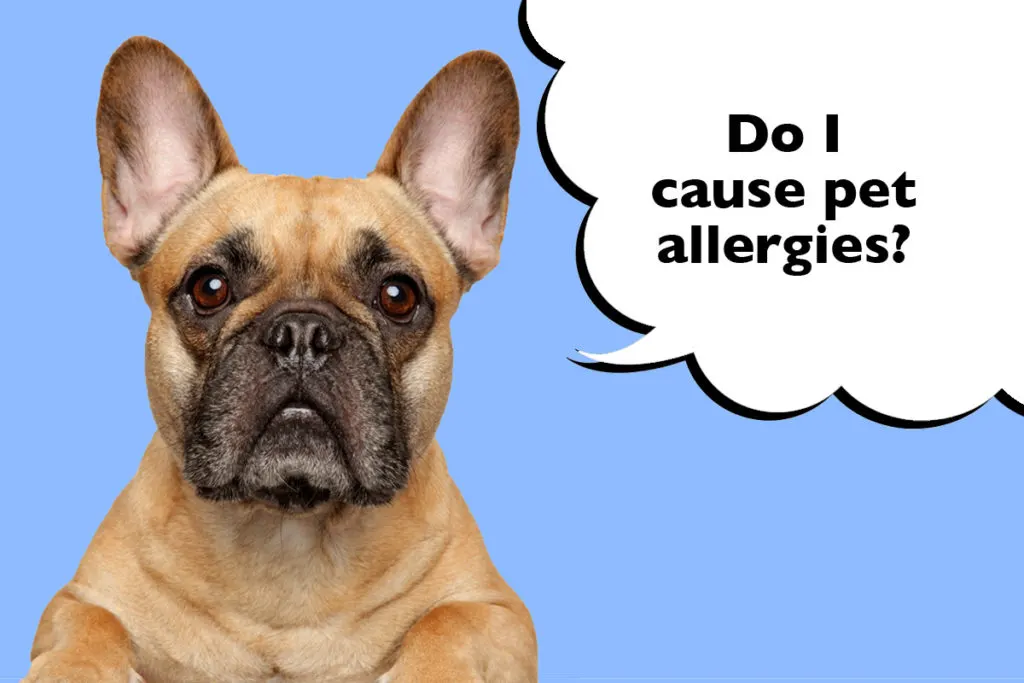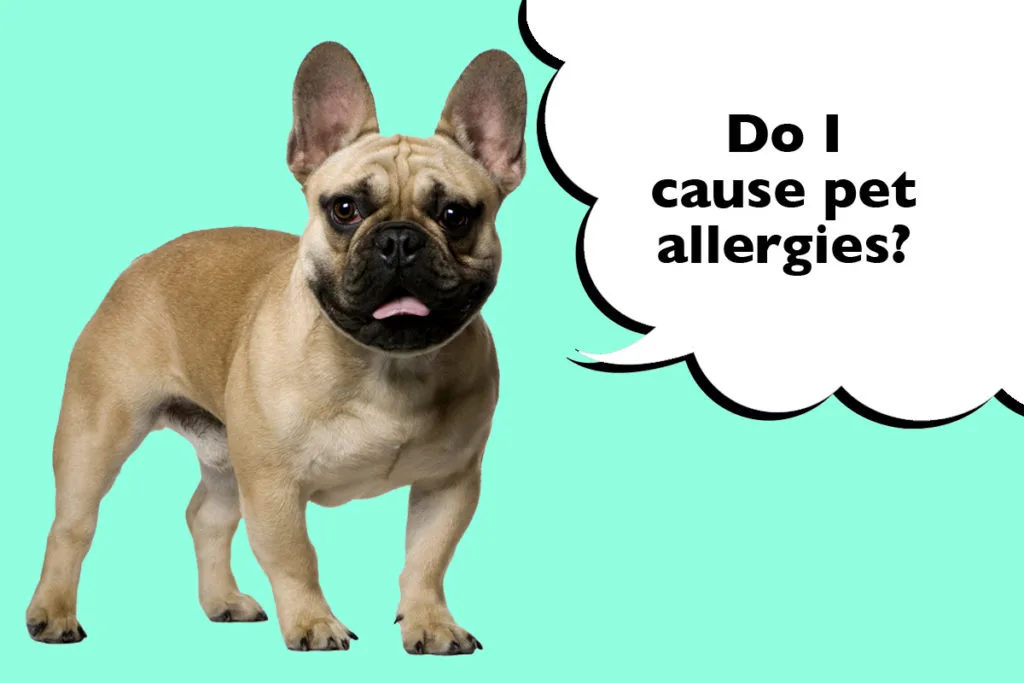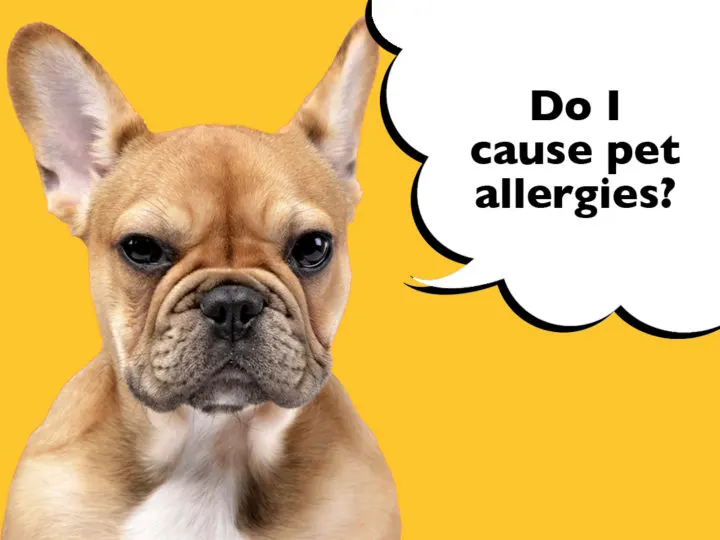Do you suffer with allergies but want to get a French Bulldog? Do you want to find out if French Bulldogs are hypoallergenic? Here’s everything you need to know about whether French Bulldogs are hypoallergenic.
Are French Bulldogs Hypoallergenic? No, French Bulldogs are not hypoallergenic. In fact, there is no dog breed that can be considered completely allergen free. French Bulldogs are considered moderate shedders, meaning they lose a fair amount of hair, which may aggravate allergies in people.
Read on to find out exactly what hypoallergenic means, why owners can be allergic to French Bulldogs, and what you can do to alleviate symptoms when in your home.
Never use the advice in this article as a substitute for professional veterinary advice or treatment. I am NOT a Vet, qualified dog trainer or dog behaviourist. This article is based on research, personal opinion and experience of owning dogs over the last 12+ years.
What Does Hypoallergenic Mean In Dogs?
Hypoallergenic means that a dog is less likely to cause an allergic reaction for those that suffer from allergies.
An allergic reaction is caused when a person’s immune system over reacts to something, such as dog hair, dander or saliva.
Certain dog breeds are thought to not cause allergic reactions for humans, although this isn’t the case for everyone.
In fact, it’s impossible to say for definite that a dog is truly hypoallergenic.
This is because every human and every dog are unique and that means their reactions will be unique too.
One French Bulldog may cause an allergic reaction to a certain person, yet another dog of the same breed may not cause their allergies to flare up.
What Causes Allergies To French Bulldogs?
Allergies to French Bulldogs are most commonly caused by the dander from their fur. However, you can also get allergies to your French Bulldog’s saliva, urine and faeces.
French Bulldogs shed a moderate amount of hair and they tend to lose hair all year round. Their shedding levels tend to increase in warmer weather too, to try and help them to keep cool.
Because they’re smooth coated, they shed tiny hairs that can be difficult to spot on your furniture and clothing. These hairs can also weave into fabrics like carpets and rugs.
So, unless your vacuum cleaner is a particularly powerful one, you may find it hard to remove all the dog hair completely. This isn’t good news for allergy sufferers!
French Bulldogs can also be prone to developing skin issues, particularly around the folds of skin on their face.
Not only does this make it more likely for their hair to fall out, but also that you’ll need to clean and treat these areas regularly.
This’ll put you in close contact with your French Bulldog more frequently.

Are Some French Bulldog Coat Colours More Hypoallergenic?
Yes, some French Bulldogs coat colours can potentially be more hypoallergenic than others.
Although no French Bulldog can be classed as hypoallergenic as they all lose hair, the diluted colours such as Blue, Lilac and Isabella can be prone to inheriting a genetic condition known as Colour Dilution Alopecia (CDA).
This condition causes a French Bulldog’s hair to become brittle which leaves it much more likely to fall out.
Not only does this cause hair thinning and bald spots on your French Bulldog, but it also means there’s more hair being shed around your home which can cause allergies to worsen.
Because CDA can also cause your French Bulldog’s skin to become dry and flaky, this increases the dander and can further aggravate allergies.
Are French Bulldog Crossbreeds More Hypoallergenic?
No, French Bulldogs mixed with other breeds are not likely to be more hypoallergenic than purebred French Bulldogs.
Just because a French Bulldog has been mixed with a breed that is considered to be more hypoallergenic, doesn’t necessarily mean their puppies will take after the parent who sheds less.
This is a common misconception which often leaves new owners in a situation where they’re allergic to their new dog.
If saliva causes your allergies to flare, it won’t matter what your French Bulldog is crossed with, as they’re likely to still cause you to have a reaction.
How Do I Know If I Am Allergic To My French Bulldog?
There is no way of knowing for definite if you’ll be allergic to a particular French Bulldog until you actually spend time with them.
So, if you can, try to spend as much time as possible with your new French Bulldog before you bring them home. This is particularly important if you already know that you suffer from pet allergies.
It may be the case that your pet allergies are more or less severe depending on the individual French Bulldog you’re interacting with.
If you experience any of the following symptoms, then it’s possible that you may be allergic to this particular French Bulldog:
- Runny Nose
- Itchy Eyes
- Itchy Nose
- Wheezing
- Coughing
- Tight chest
- Skin Rashes
If you get symptoms and are unsure about the puppy or dog, it’s best to walk away. The last thing you want is to have to rehome them because they’re just not tolerable for you.
However, there may be some things you can do to make living with allergies and your French Bulldog a bit easier.
How Do I Treat Pet Allergies To My French Bulldog?
French Bulldogs are a sociable and friendly breed that love attention from their family. But, if you have allergies, this can make life very difficult indeed.
Not only does this mean that their fur and dander are in regular contact with you, but even their saliva can also cause allergies to flare.
You can’t stop yourself from being allergic to your French Bulldog completely. However, there are some things that you may find helpful for managing your allergy symptoms:
Medication
If your pet allergy symptoms aren’t particularly severe, they can potentially be helped by taking antihistamine tablets.
However, this should always be discussed with your Doctor first so they can recommend which medication may be best for your personal circumstances.

Clean Regularly
By regularly vacuuming your home thoroughly, you should able to keep on top of the dog hair and dander in the house.
Ideally, choose a vacuum with a HEPA filter as these tend to be best for dog owners. You can even buy vacuum cleaners specifically for pet hair!
It’s also a good idea to dust around your home using a damp cloth, rather than a dry one. This stops the dust and dander particles floating around in the air.
It’s really important to wash your French Bulldog’s bedding regularly too, to remove any buildup of hair and dander which may accumulate there.
Grooming
Brush your French Bulldog regularly to reduce the amount of hair and dander they shed around your home.
Not only can this help to minimise your allergies, but it also keeps your French Bulldog’s coat in better condition.
It may also help if your bathe your French Bulldog using a mild dog shampoo. Just be sure not to bathe them too often as this could cause them to develop skin conditions.
Sleeping Arrangements
Avoid letting your French Bulldog sleep on the furniture or in bed with you. These are prime areas for dog hair and dander to collect in and flare allergies.
Instead, provide them with their own comfortable bed and encourage them to use that instead.
Diet
If you feed your French Bulldog a nutritious and high-quality diet, it’ll improve their skin and coat condition.
This may stop them shedding quite so much than they would on a poor-quality diet.
In general, premium dog foods are much more likely to keep your French Bulldog in optimum condition.
Flooring
It’s easier to clean hard flooring like tiles, wood and Lino, compared with carpets and rugs.
If possible, any carpets and rugs in your home should be removed as these are magnets for dog hair and dander.
Hard floors can be hoovered and steam cleaned which is a great for keeping pet allergies at bay!
Air Purifiers
Using an air purifier in your home can help to remove any airborne dog hair or dander from your French Bulldog, before it settles on surfaces around the home.
By emptying the air purifier regularly, this can help to keep pet allergies to a minimum!
So there you have it! French Bulldogs are not hypoallergenic as they shed moderate amounts of hair all year round, which can cause issues for people with pet allergies. However, cleaning, grooming and air purifiers may go some way to helping alleviate symptoms!
What do I do next?
Thank you for reading all the way to the end of this article, your support for my blog means everything to me! If you found this article helpful, please kindly share below. Thank you!

